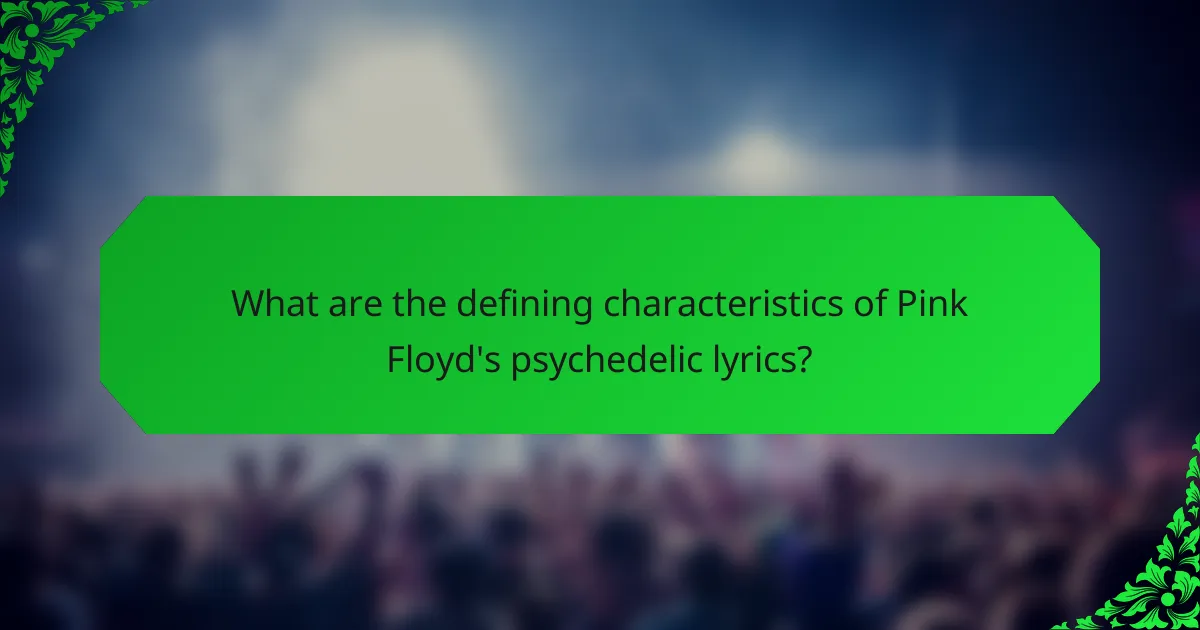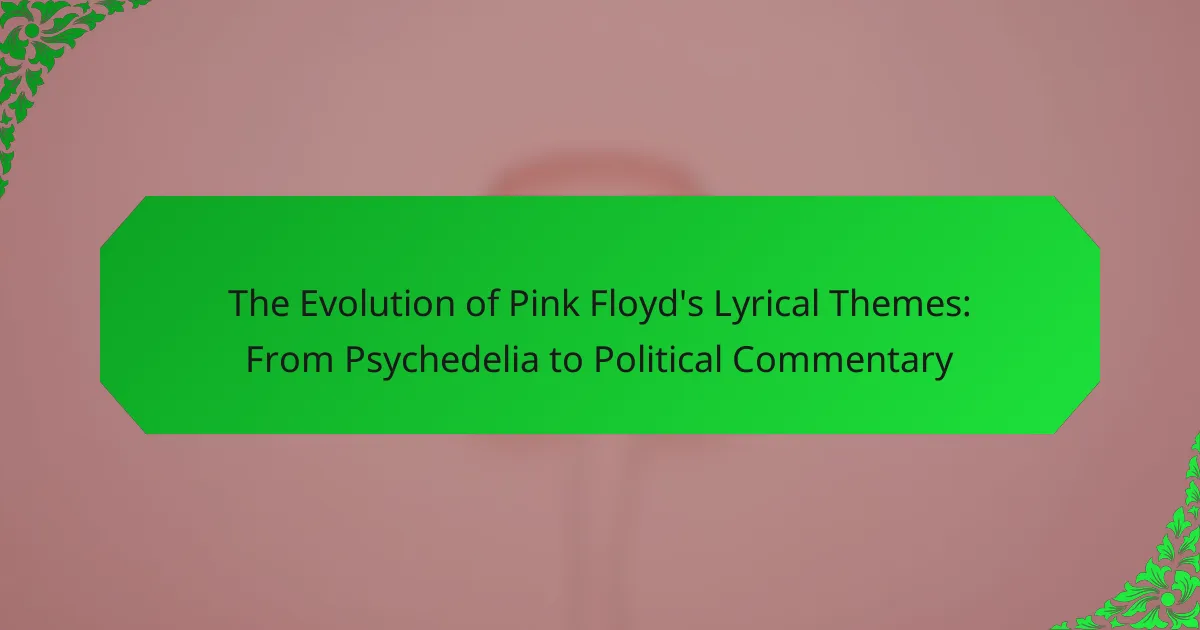Pink Floyd is a renowned band known for their profound lyrical themes that encompass alienation, mental illness, existentialism, and political commentary. Their music explores the complexities of the human condition and societal issues through vivid imagery and abstract narratives. Key songs such as “Comfortably Numb” and “The Wall” address feelings of isolation and mental health struggles, while tracks like “Another Brick in the Wall” critique institutional authority and the education system. This article examines the evolution of Pink Floyd’s lyrical themes, highlighting their transition from psychedelic explorations to incisive political critiques, revealing the depth and emotional resonance of their work.

What are the key lyrical themes in Pink Floyd’s music?
Key lyrical themes in Pink Floyd’s music include alienation, mental illness, and existentialism. Their lyrics explore the human condition and societal issues. The theme of alienation is prominent in songs like “Comfortably Numb.” It reflects feelings of isolation and disconnection. Mental illness is a recurring motif, especially in “The Wall.” This album addresses the struggles of the mind and personal trauma. Existentialism is evident in tracks like “Time,” which contemplates the nature of life and mortality. Additionally, political commentary appears in songs like “Another Brick in the Wall,” critiquing the education system. These themes collectively illustrate the band’s profound engagement with complex emotional and societal issues.
How did Pink Floyd’s lyrics evolve over time?
Pink Floyd’s lyrics evolved from abstract and surreal themes to more concrete social and political commentary. In their early works, such as “The Piper at the Gates of Dawn,” lyrics were heavily influenced by psychedelia and whimsical imagery. Songs like “Interstellar Overdrive” showcased this abstract style. As the band progressed, particularly with “The Dark Side of the Moon,” lyrics began to reflect deeper existential themes and human experiences. Tracks like “Time” and “Money” addressed issues of capitalism and mental health. By the time of “The Wall,” lyrics became explicitly political, tackling issues of war, isolation, and societal criticism. This shift is evident in songs like “Another Brick in the Wall,” which critiques the education system. Overall, Pink Floyd’s lyrical evolution mirrors their musical experimentation and growing engagement with contemporary issues.
What influences shaped the early psychedelic themes in Pink Floyd’s lyrics?
Early psychedelic themes in Pink Floyd’s lyrics were shaped by various influences. The band’s exposure to the counterculture movement of the 1960s played a significant role. This era was marked by experimentation with drugs, which influenced their creative processes. Additionally, the works of surrealist artists and writers inspired their abstract and dreamlike imagery. The music of the avant-garde and jazz genres also contributed to their unique sound. Furthermore, personal experiences and existential questions were reflected in their lyrics. These elements combined to create a rich tapestry of psychedelic themes in their early work.
How did the band’s sound contribute to their lyrical evolution?
The band’s sound significantly influenced their lyrical evolution by creating an immersive atmosphere that complemented their themes. Pink Floyd’s early sound, characterized by psychedelic rock, allowed for abstract and surreal lyrics. This sonic landscape encouraged exploration of consciousness and existential themes. As their sound evolved into progressive rock, the lyrics became more structured and narrative-driven. The incorporation of orchestral elements and synthesizers added depth to their storytelling. This shift aligned with their growing focus on societal issues and personal experiences. For example, the album “The Wall” combined rock opera with poignant lyrics addressing alienation and war. Thus, the band’s evolving sound directly shaped the complexity and direction of their lyrical content.
What role did societal changes play in Pink Floyd’s lyrical themes?
Societal changes significantly influenced Pink Floyd’s lyrical themes. The band emerged during the 1960s, a time of social upheaval and cultural revolution. Events like the Vietnam War and civil rights movements shaped their perspective. Their music addressed alienation, mental health, and authoritarianism, reflecting societal anxieties. For example, “The Wall” critiques isolation and societal pressures. The lyrics resonate with listeners facing similar struggles. Pink Floyd’s evolution mirrors the changing landscape of society. Their themes remain relevant, showcasing the impact of societal shifts on artistic expression.
How did political events influence the band’s songwriting?
Political events significantly influenced Pink Floyd’s songwriting. The band’s lyrics often reflected societal unrest and governmental critique. For instance, the Vietnam War prompted songs like “Us and Them,” addressing themes of conflict and division. The political climate of the 1970s, marked by disillusionment, inspired the album “Animals,” which critiqued capitalism and social hierarchies. Additionally, the rise of authoritarianism in the UK influenced “The Wall,” exploring themes of isolation and rebellion against oppressive systems. The band’s engagement with these events gave their music depth and resonated with listeners during turbulent times.
What are some notable songs that reflect societal issues?
Notable songs that reflect societal issues include “Another Brick in the Wall, Part 2” by Pink Floyd. This song critiques the educational system and its dehumanizing effects. It became an anthem for students, highlighting the struggle against oppressive authority. Another example is “Fortunate Son” by Creedence Clearwater Revival. This song protests against class inequality and the Vietnam War. It emphasizes how wealth can exempt individuals from the burdens of war. “Fight the Power” by Public Enemy addresses racial injustice and systemic oppression. It calls for empowerment and resistance against societal norms. These songs serve as powerful commentaries on pressing social issues.

What are the defining characteristics of Pink Floyd’s psychedelic lyrics?
Pink Floyd’s psychedelic lyrics are characterized by vivid imagery and abstract themes. They often explore concepts like existentialism and consciousness. The lyrics frequently employ surreal and dreamlike narratives. Themes of alienation and isolation are prominent throughout their work. Additionally, their use of metaphor enhances the depth of meaning. The songs often reflect the influence of the counterculture movement of the 1960s. For example, “The Piper at the Gates of Dawn” showcases these defining traits. Overall, Pink Floyd’s lyrics create an immersive experience for listeners.
How do surreal imagery and abstract concepts manifest in their early work?
Surreal imagery and abstract concepts manifest in Pink Floyd’s early work through vivid, dream-like lyrics and unconventional song structures. Their debut album, “The Piper at the Gates of Dawn,” features surreal themes influenced by the psychedelic movement. Songs like “Interstellar Overdrive” showcase instrumental experimentation, creating an otherworldly atmosphere. The lyrics often evoke disjointed narratives and fantastical elements, as seen in “Astronomy Domine.” This approach reflects the band’s exploration of consciousness and perception. These elements are integral to their identity during this period, establishing a foundation for their later thematic evolution.
What specific songs exemplify these psychedelic themes?
Specific songs that exemplify psychedelic themes include “Astronomy Domine,” “Interstellar Overdrive,” and “See Emily Play.” “Astronomy Domine” features cosmic imagery and surreal lyrics that evoke a sense of space exploration. “Interstellar Overdrive” is an instrumental track characterized by its experimental soundscapes and improvisational style. “See Emily Play” presents dreamlike narratives and whimsical elements typical of psychedelic music. Each of these songs showcases Pink Floyd’s early embrace of psychedelic influences, contributing to their unique sound and lyrical depth during that era.
How did the use of soundscapes enhance the lyrical experience?
The use of soundscapes enhanced the lyrical experience by creating immersive auditory environments. These soundscapes complemented the themes and emotions conveyed in the lyrics. For instance, in Pink Floyd’s “The Dark Side of the Moon,” ambient sounds evoke feelings of anxiety and isolation. This synergy between sound and lyrics allows listeners to connect more deeply with the narrative. Additionally, soundscapes provide context that enriches the storytelling aspect of the lyrics. The incorporation of effects like echoes and reverb further intensifies the emotional impact. This technique has been pivotal in transforming the listening experience into a multi-sensory journey. Overall, soundscapes serve to elevate the lyrical content, making it more poignant and memorable.
What transition occurred in Pink Floyd’s lyrics towards political commentary?
Pink Floyd’s lyrics transitioned from abstract and psychedelic themes to direct political commentary. Early works like “The Piper at the Gates of Dawn” focused on surrealism and personal experiences. By the 1970s, albums such as “Animals” and “The Wall” addressed social issues and critiques of authority. “Animals” used allegory to reflect on capitalism and class struggle. “The Wall” explored themes of isolation and societal pressure, highlighting the impact of war and political systems. This shift was influenced by the political climate of the time, including the Vietnam War and authoritarian regimes. The band’s evolution reflects a growing concern for social justice and political accountability.
What albums mark this shift in lyrical focus?
The albums that mark the shift in Pink Floyd’s lyrical focus are “The Dark Side of the Moon,” “Animals,” and “The Wall.” “The Dark Side of the Moon,” released in 1973, introduced themes of mental health and societal pressures. “Animals,” released in 1977, critiqued capitalism and social classes through animal metaphors. “The Wall,” released in 1979, explored isolation and personal trauma. Each album reflects a departure from earlier psychedelic themes to more political and introspective commentary.
How did personal experiences of band members influence this change?
Personal experiences of Pink Floyd’s band members significantly influenced their lyrical themes. Roger Waters’ upbringing in post-war Britain shaped his views on authority and war. His father’s death in World War II fueled his anti-war sentiments. David Gilmour’s experiences with mental health issues contributed to the exploration of isolation in their music. Syd Barrett’s struggles with mental illness inspired themes of loss and disillusionment. These personal narratives added depth to their lyrics, transitioning from psychedelic imagery to poignant political commentary. The band’s collective experiences reflected societal issues, making their music resonate with broader audiences.

What are the unique attributes of Pink Floyd’s political lyrics?
Pink Floyd’s political lyrics are characterized by their critical examination of authority and societal issues. They often incorporate themes of war, oppression, and existential despair. The lyrics reflect a deep skepticism towards government and institutional power. Songs like “Another Brick in the Wall” critique the education system and its impact on individuality. “Us and Them” addresses the division between social classes and the futility of conflict. The band’s use of metaphor and imagery enhances the emotional weight of their messages. Their political commentary is often intertwined with personal narratives, creating a relatable context. Overall, Pink Floyd’s political lyrics stand out for their profound social critique and artistic depth.
How do they address themes of alienation and societal critique?
Pink Floyd addresses themes of alienation and societal critique through their lyrics and musical compositions. Their song “Comfortably Numb” illustrates feelings of disconnection and emotional numbness. The lyrics depict a struggle between reality and escapism, highlighting alienation in modern life. In “Another Brick in the Wall,” they critique the educational system, portraying it as oppressive. This song emphasizes the loss of individuality and the impact of societal structures on personal identity. Additionally, “Wish You Were Here” expresses longing and loss, reflecting on the disconnection from both self and society. These themes resonate with listeners, making their critique of societal norms powerful and relatable.
What specific lyrics illustrate these themes?
The specific lyrics that illustrate Pink Floyd’s themes include lines from “The Wall.” The song “Another Brick in the Wall, Part 2” expresses criticism of the educational system. The lyrics “We don’t need no education” highlight rebellion against authoritarian structures.
In “Wish You Were Here,” the lyrics “So, so you think you can tell” reflect feelings of alienation and loss. This theme connects to the band’s experiences in the music industry.
“Time” features lyrics that convey the urgency of life and the passage of time. The line “Time is a thief” encapsulates the theme of existential reflection.
These examples demonstrate Pink Floyd’s evolution from exploring personal and psychedelic themes to addressing broader social and political issues.
How do musical elements complement the political messages in their songs?
Musical elements enhance the political messages in songs by creating emotional resonance. The use of minor keys often evokes feelings of sadness or despair. This is evident in Pink Floyd’s “Another Brick in the Wall,” which critiques the education system. The driving rhythms in this song convey urgency and rebellion against authority. Instrumentation, such as the use of electric guitars, adds intensity to the message. Additionally, vocal delivery can express anger or frustration, reinforcing the lyrical content. The combination of these elements creates a powerful synergy that amplifies the political themes. Overall, musicality serves as a vehicle for conveying complex political ideas effectively.
What impact has Pink Floyd’s lyrical evolution had on music and culture?
Pink Floyd’s lyrical evolution has significantly influenced music and culture. Their transition from psychedelic themes to political commentary reshaped rock music’s narrative depth. Early works like “The Piper at the Gates of Dawn” explored surrealism and consciousness. Later, albums like “The Wall” addressed societal issues and personal struggles. This shift encouraged other artists to tackle complex themes in their lyrics. Pink Floyd’s influence is evident in genres such as progressive rock and alternative music. Their exploration of mental health and existentialism resonates with audiences, fostering cultural discussions. The band’s innovative use of sound and lyrics paved the way for future musical experimentation.
How have their themes influenced subsequent generations of artists?
Pink Floyd’s themes have significantly influenced subsequent generations of artists. Their exploration of existentialism, mental health, and societal critique resonates across various art forms. For instance, the album “The Dark Side of the Moon” addresses themes of time and mental illness, inspiring countless musicians and visual artists. Many contemporary artists cite Pink Floyd’s ability to merge music with profound philosophical questions as a benchmark. Additionally, their innovative use of sound and visual elements in performances has set a standard for live shows in modern music. This legacy is evident in genres ranging from progressive rock to electronic music, where artists continue to explore similar themes and experiment with auditory experiences.
What legacy do their lyrical themes leave in contemporary music?
Pink Floyd’s lyrical themes have significantly influenced contemporary music. Their exploration of complex emotions and societal issues set a precedent for future artists. The band’s focus on existentialism and alienation resonates in modern genres like alternative rock and progressive music. Songs such as “The Wall” address mental health and personal struggle, inspiring artists to tackle similar subjects. Their innovative use of narrative and concept albums has shaped the structure of many contemporary works. Additionally, Pink Floyd’s political commentary encourages musicians to engage with social issues. This legacy is evident in the works of bands like Radiohead and Muse, who echo similar themes. Overall, Pink Floyd’s impact remains a cornerstone in the evolution of lyrical content in music today.
What practical insights can we gain from Pink Floyd’s lyrical evolution?
Pink Floyd’s lyrical evolution reveals insights into societal change and personal introspection. Their early work, characterized by psychedelic themes, reflects the counterculture movement of the 1960s. This period emphasizes exploration and the human experience. As their music progressed, they began addressing darker themes, such as alienation and mental health. For example, “The Wall” critiques the isolation of individuals in modern society. Their later political commentary highlights the impact of war and capitalism. Songs like “Animals” showcase their critique of corporate greed. This evolution illustrates how art responds to cultural contexts and personal experiences. Pink Floyd’s journey offers a lens to understand broader societal issues through music.
The main entity of the article is Pink Floyd, a renowned rock band known for their profound lyrical themes. The article explores the evolution of Pink Floyd’s lyrics, highlighting key themes such as alienation, mental illness, existentialism, and political commentary. It discusses how their early psychedelic influences transitioned to more concrete social critiques, reflecting societal changes and personal experiences of band members. Notable albums like “The Dark Side of the Moon,” “Animals,” and “The Wall” are examined for their thematic depth and impact on music and culture, illustrating the band’s lasting legacy in contemporary artistic expression.
